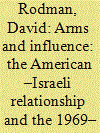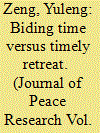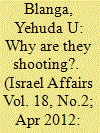|
|
|
Sort Order |
|
|
|
Items / Page
|
|
|
|
|
|
|
| Srl | Item |
| 1 |
ID:
164321


|
|
|
|
|
| Summary/Abstract |
The dominant view of the American‒Israeli relationship holds that it has been driven primarily by shared interests and values; however, since the 1960s, the relationship has been governed first and foremost by a ‘security-for-autonomy’ bargain. Under the terms of this bargain, Washington has obtained a significant amount of influence over Israeli foreign policy in exchange for American arms transfers to Israel. The 1969‒1970 War of Attrition clearly illustrates how this bargain has operated in practice. The United States manipulated Israeli military conduct in a manner that accommodated American national interests by withholding or supplying arms at key junctures of the war.
|
|
|
|
|
|
|
|
|
|
|
|
|
|
|
|
| 2 |
ID:
180195


|
|
|
|
|
| Summary/Abstract |
Trade-conflict studies focus on whether and how economic interdependence suppresses interstate conflict initiation. Meanwhile, formal theories of war show that conflict initiation is inherently tied to its termination. In this article, I seek to bridge the two literature by utilizing a war of attrition model to formalize the relationship between economic dependence and conflict duration. I theorize that the strategic calculation ultimately comes down to a trade-off between biding one’s time and retreating in a timely manner. In the context of economic attrition, states weigh the relative costs of suffering an additional round of economic disruption against the potential benefits of winning the disputed good. As such, economic dependence can have both coercive and informational effects and these effects are contingent upon issue salience. When the issue salience is low, the coercive effect dominates; states are more likely to quit conflicts as they suffer proportionally larger economic costs. When the issue salience is high enough, the informational effect can kick in; states are less likely to quit conflicts with increasing economic costs. I test these implications on the International Crisis Behavior (ICB) and the Militarized Interstate Dispute (MID) data, finding strong support for the informational effect and suggestive evidence for the coercive one.
|
|
|
|
|
|
|
|
|
|
|
|
|
|
|
|
| 3 |
ID:
080342


|
|
|
|
|
| Publication |
2007.
|
| Summary/Abstract |
Nationalist terrorism aspires to independence or greater autonomy for some territory. The combination of territorial claims and armed struggle gives rise to a very definite strategy, violence intended to coerce the State. Nationalist terrorist organizations kill repeatedly with the aim of breaking the will of the State. They engage in a peculiar sort of war of attrition with the State. This paper analyzes comparatively the war of attrition strategy in two organizations, ETA and the IRA. The focus of the paper is on strategy: it examines how ETA and the IRA understood their activity in terms of war of attrition and how they developed their strategy subject to some constraints, such as the moderate preferences of their supporters. I show that popularity constraints account for the high degree of selectivity in their killings. The analysis is based on a combination of historical information, internal documents, and a large data set I have constructed of the killings of these two organizations.
|
|
|
|
|
|
|
|
|
|
|
|
|
|
|
|
| 4 |
ID:
188851


|
|
|
|
|
| Summary/Abstract |
The article analyses the ongoing Russia-West confrontation manifested mainly in the armed conflict in Ukraine, the world’s largest war of sanctions, a growing confrontation in cyberspace and politics, the erosion of the system of arms control treaties and a sharp reduction of cooperation in the humanitarian sphere. Russia and the West are fighting not only for influence in Ukraine but also over the future of international relations on a global scale in the coming decades. The most plausible development seems to be a war of attrition, which, however, does not rule out the risk of escalation.
|
|
|
|
|
|
|
|
|
|
|
|
|
|
|
|
| 5 |
ID:
111896


|
|
|
|
|
| Publication |
2012.
|
| Summary/Abstract |
This article examines the episode of an almost-forgotten war in the history of the Middle East conflict - the War of Attrition. While everyone agrees that the War of Attrition ended on August 7, 1970, there is controversy over when the war broke out. Some consider it to have begun in the summer of 1968 and others believe that it began with the bloody events that occurred immediately after the Six Day War. The IDF considers March 8, 1969 to be the day the war broke out because from that day on there was continuous fighting with the Egyptian side of the Suez Canal.
To show the American and Israeli failure, in the first four months of hostilities along the Suez Canal, to understand that the area was facing renewed conflict and another round of war. A direct consequence of that failure was the inability of both sides to adopt a suitable policy towards the emerging crisis. The article examines the beginning of the War of Attrition in the diplomatic arena, the Egyptian aims and objectives, and the American reaction. Other than presenting the facts, this article examines what the United States thought of the Egyptian moves, if and how much the United States was influenced by those moves, and Egyptian President Gamal Abdel Nasser's reaction to the steps taken by the Americans. Since the main focus is on the American foreign policy, most of the sources used for this article are American. In order to complete the picture, it is also important to examine the Israeli point of view and the last part will focus on that.
|
|
|
|
|
|
|
|
|
|
|
|
|
|
|
|
|
|
|
|
|